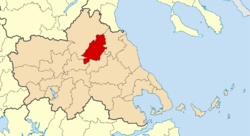Tyrnavos
|
Tyrnavos Τύρναβος |
|
|---|---|
 |
|
| Coordinates: 39°44′N 22°17′E / 39.733°N 22.283°ECoordinates: 39°44′N 22°17′E / 39.733°N 22.283°E | |
| Country | Greece |
| Administrative region | Thessaly |
| Regional unit | Larissa |
| Area | |
| • Municipality | 525.3 km2 (202.8 sq mi) |
| • Municipal unit | 370.56 km2 (143.07 sq mi) |
| Population (2011) | |
| • Municipality | 25,032 |
| • Municipality density | 48/km2 (120/sq mi) |
| • Municipal unit | 16,977 |
| • Municipal unit density | 46/km2 (120/sq mi) |
| Community | |
| • Population | 12,572 (2011) |
| Time zone | EET (UTC+2) |
| • Summer (DST) | EEST (UTC+3) |
| Postal code | 401 00 |
| Vehicle registration | ΡΙ |
Tyrnavos (Greek: Τύρναβος) is a municipality in the Larissa regional unit, of the Thessaly region of Greece. It is the second largest town of the Larissa regional unit, after Larissa. The town is near the mountains and the Thessalian Plain. The river Titarisios, a tributary of the Pineios, flows through the town. Tyrnavos is bypassed by the GR-3 (Larissa - Kozani - Niki) and has an old road connecting the town to Elassona. It will be linked with a superhighway numbered 3 (A3) with an unscheduled opening date. Tyrnavos is located south-southwest of Thessaloniki and Katerini, northwest of Larissa, east-northeast of Trikala and south-southeast of Elassona and Kozani. Here live an important community of aromanians.
Tyrnavos was built by the Slavs as a pastoral settlement with huts in the 7th or 8th century AD. In 1423 the Turkish general Turahan Bey conquered the area of Thessaly. Turahan founded Tyrnavos, gathering the local inhabitants and settling them in the new town, which he adorned with several buildings and which he granted extensive privileges. In 1770 there were 16 churches and 6 mosques in the town. Tirnavos was liberated from Ottoman rule on September 1, 1881 and by decision of the Berlin Congress, Greece annexed it. The Turkish bath is the only Muslim building to have been saved as well as some other preservable buildings of the town.
The city holds a famous annual carnival, which has its roots in antiquity. It is at least 100 years old. The first written records about its celebration date from 1898. In the early 20th century, the carnival of Tirnavos has been the target of bitter criticism and successive attacks by the governments of that time that regarded it as an offence against the moral standards of people. However, the prohibition of the carnival didn’t intimidate the inhabitants of Tirnavos that celebrated it even secretly.
...
Wikipedia


